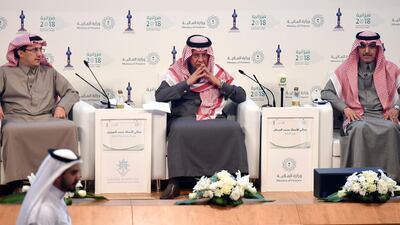Saudi Arabia’s budget for 2018 demonstrates the government’s great optimism for its economic diversification and expansion plans, overseen by Crown Prince Mohammed bin Salman, the architect of Vision 2030.
That was the message from economy minister Mohammad Al Tuwaijri, who told a news conference in Riyadh that the country was moving to “a more optimistic scenario” in its fiscal planning.
“We’re very satisfied with what happened in 2017, and we’ll continue on this journey,” he declared.
Unveiling its largest ever budget on Tuesday, the kingdom projected a return to growth next year amid efforts to lift an economy affected by lower oil revenues and fiscal tightening during 2017.
GDP, which rose 1.7 per cent last year, is expected to shrink by 0.5 per cent in 2017 but grow by 2.7 per cent in 2018 and 2019.
Riyadh plans to increase spending to a record 978 billion riyals in 2018, the finance ministry said. That is up from 926 billion riyals this year.
Next year’s deficit is forecast to fall to 195 billion riyals, or 7.3 per cent of GDP, compared with a shortfall of 230 billion riyals (8.9 per cent of GDP) in 2017.
“The expansionary 2018 budget includes a complete set of new development initiatives that aim to create financial and economic stability that was outlined in Vision 2030,” the crown prince said.
“About 50 percent of the new budget will be financed from non-oil sources,” he added.
Analysts and commentators welcomed the announcements as the kingdom prepares for the post-oil era.
“This new budget shows that the recession is over as the government undertakes major reform measures,” Khalid Ashaerah, a private business consultant in Riyadh, told CNN. “The focus now will be on services and supporting the private sector to increase job growth.”
Monica Malik, chief economist at Abu Dhabi Commercial Bank, said Riyadh needed to shift policy towards faster growth to support long-term reforms designed to reduce the economy's reliance on oil exports.
“They are balancing fiscal consolidation required by rating agencies and international investors - they can't have a blowout budget - with the domestic need to show progress with the economic transformation plan, and boost the feel-good factor with stronger growth,” she said.
Saudi Arabia is implementing an economic overhaul plan and various reforms under the 2020 National Transformation Programme and its over-arching Vision 2030 agenda to help wean the country off oil income and create new revenue streams.
The Arab world’s biggest economy intends to continue with an expansionary budget for 2019 with spending projections of 1 trillion riyals, with a fiscal deficit representing 5.9 per cent of GDP. For 2020, the kingdom is projecting a 1.05 trillion riyals budget with a fiscal deficit of 4.9 per cent of GDP.
Government revenue is forecast to rise 12.5 per cent to 783bn riyals next year from 696bn riyals in 2017. Oil revenue is projected to rise 11.8 per cent to 492bn riyals from 440bn riyals in 2017, while non-oil revenue will grow 13.7 per cent to 291bn riyals.
The government has pushed back its deadline for a balanced budget to 2023 from 2020, giving the economy time to resume growth, the finance ministry said.
Hettish Karmani, head of research at Muscat based U-Capital, said: “To steer the economy to a new path, they have pushed for expansionary budget and put the austerity on hold.”
He continued: “It is a positive sign for the markets as well and we should see good momentum in the equity markets [on Wednesday] morning.”

